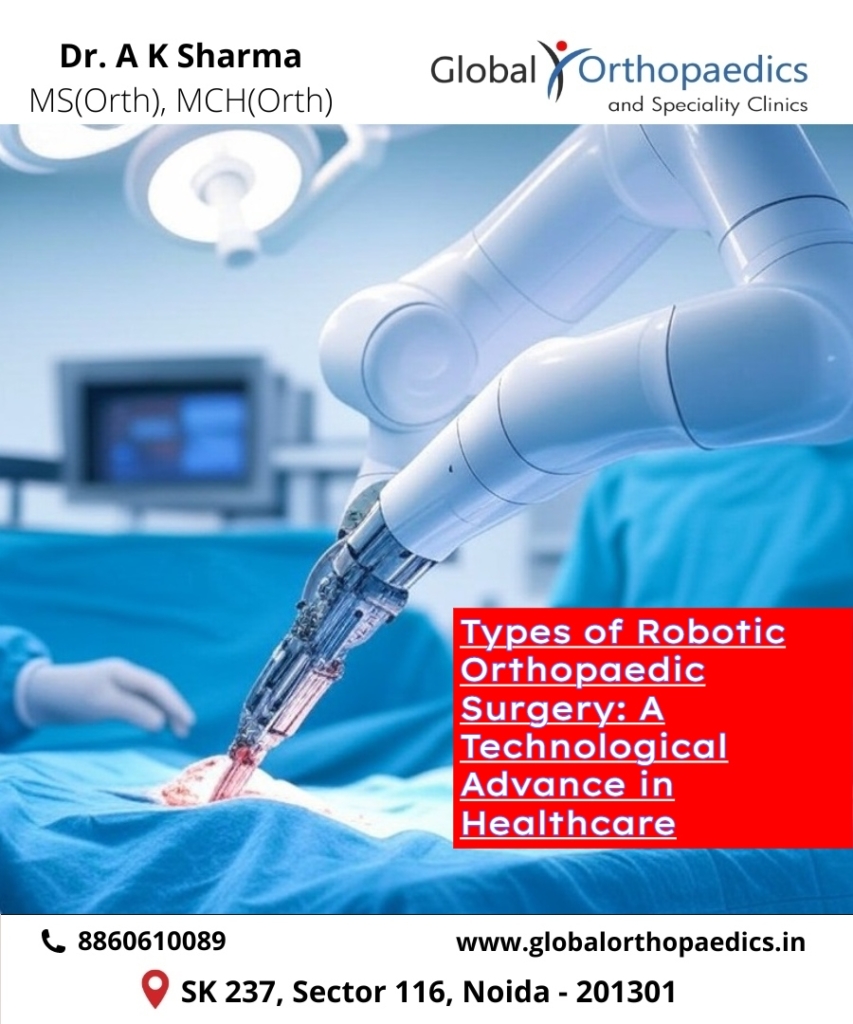Robotic surgery has revolutionized the field of orthopedics, offering numerous advantages over traditional surgical techniques. By combining precision, accuracy, and flexibility, robotic systems empower surgeons to perform complex procedures with greater efficiency and reduced risk.

What is Robotic Orthopaedic Surgery?
Robotic orthopaedic surgery involves the use of robotic systems to assist surgeons in performing various orthopedic procedures. These robotic systems are equipped with advanced imaging and navigation technology, allowing surgeons to visualize the surgical site in 3D and perform precise movements with millimeter accuracy.
Types of Robotic Orthopaedic Surgery in Noida
- Robotic Knee Surgery:
- Robotic Knee Replacement: This procedure involves replacing a damaged knee joint with an artificial one. Robotic assistance enables surgeons to accurately position the implant, ensuring optimal alignment and function.
- Robotic Knee Resurfacing: A less invasive option for early-stage knee arthritis, robotic knee resurfacing involves resurfacing the damaged joint surfaces. Robotic precision enhances the accuracy of bone cuts and implant placement.
- Robotic Hip Surgery:
- Robotic Hip Replacement: This procedure involves replacing a damaged hip joint with an artificial one. Robotic assistance allows for precise bone cuts and implant positioning, leading to improved outcomes and faster recovery.
- Robotic Spine Surgery:
- Robotic Spine Fusion: This procedure involves fusing two or more vertebrae to stabilize the spine. Robotic assistance enables surgeons to perform complex procedures with greater accuracy and minimal tissue damage.
- Robotic Disc Replacement: This procedure involves replacing a damaged disc with an artificial one. Robotic precision ensures accurate placement of the implant and minimizes the risk of nerve damage.
- Robotic Shoulder Surgery:
- Robotic Shoulder Arthroplasty: This procedure involves replacing a damaged shoulder joint with an artificial one. Robotic assistance enables surgeons to perform complex procedures with greater precision and less invasiveness.
Benefits of Robotic Orthopaedic Surgery
- Increased Precision: Robotic systems offer unparalleled precision, allowing surgeons to perform delicate procedures with millimeter accuracy.
- Minimally Invasive: Robotic surgery often involves smaller incisions, leading to less pain, faster recovery, and reduced scarring.
- Improved Outcomes: Robotic assistance can lead to better outcomes, including improved range of motion, reduced pain, and faster rehabilitation.
- Reduced Risk of Complications: Robotic surgery can minimize the risk of complications, such as nerve damage and infection.
Conclusion
Robotic orthopaedic surgery represents a significant advancement in the field of orthopedic care. By combining the precision of technology with the skill of Dr. A K Sharma, robotic systems are transforming the way orthopedic procedures are performed, leading to better outcomes and improved patient satisfaction.


